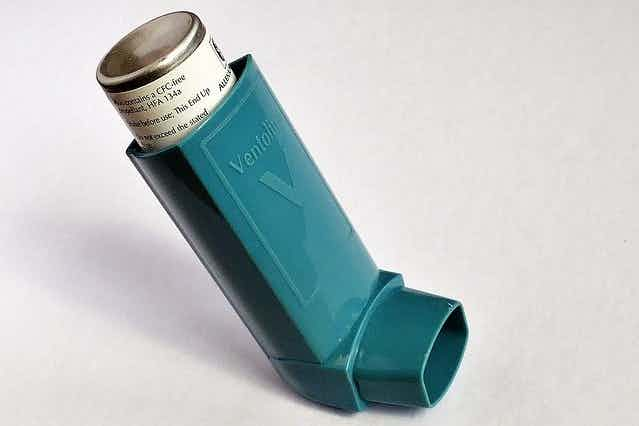According to the British Lung Foundation, 8 million people in the UK suffer from asthma. This makes up 12% of the population, making it highly likely that you know somebody with asthma. But what is asthma, what causes it, and what does an asthma attack look like? This article will help you to discover the answers.
What is asthma?
Asthma is a disease that affects the lungs; it is caused by inflammation of the airways and is characterised by shortness of breath, wheezing, coughing, and a feeling of tightness in your chest. The causes can be either genetic or environmental. Asthma can affect both males and females and tends to affect both in similar numbers.
You are most likely to be diagnosed with asthma between 11 and 20, but many people in their 20s are diagnosed too. That said, people of all ages can be diagnosed with asthma. For example, in 2012, 10,135 people aged 81 and over were diagnosed with asthma.
What are the causes of asthma?
There are three leading causes of asthma: environment, genetics, or pre-existing medical conditions. There is also a theory that a lack of exposure to bacteria and germs as a young child could lead to asthma. The argument that "children these days need to spend more time getting dirty" could well be accurate.
However, this is so far just a hypothesis. One argument against it is that children in less affluent countries develop asthma in increasing numbers. As one study stated:
"[We] present evidence that calls for caution when associating hygiene with the pathogenesis of asthma and other allergic conditions."
- Erik van Tilburg Bernardes & Marie-Claire Arrieta (2017)
Throwing your grandchildren into a muddy puddle may not affect their ability to avoid asthma and could lead to a terse conversation with their parents!
Genetic causes of asthma
If a child develops asthma before 12, this is most likely due to genetics. Several genes are associated with inflammation and your immune system that can cause asthma.
There are differences between people, though. For example, some people have a genetic predisposition towards asthma. In contrast, others have asthma affected by exposure to an endotoxin, such as cigarette smoke or dog hair.
Environmental causes of asthma
The link between air pollution and asthma hasn't yet been fully explained, but there appears to be a correlation. It probably isn't a coincidence that the areas with the worst air pollution in the US also have the most asthma cases.
Another example of an environmental cause of asthma is smoking during pregnancy, which leads to similar symptoms to asthma. Dust, mould, and allergens such as feathers can also cause asthma. Pollen is also a known trigger for asthma.
What type of disease is asthma?
Asthma is an inflammatory disease that affects the lungs. It is known as a long-term disease because it can last for life. However, not all forms of asthma do last forever. For example, childhood asthma can end when the child grows older but may reoccur later on in life.
Asthma caused by allergies can be seasonal. For example, asthma triggered exclusively by pollen will not affect you in winter.
What are the different types of asthma?
According to the American College of Allergy, Asthma & Immunology, there are six main types of asthma.
- Adult-onset asthma
- Allergic asthma
- Asthma-COPD overlap
- Exercise-induced asthma
- Nonallergic asthma
- Occupational asthma
Let's go over all six to give you a broad overview of what they are and how they differ from each other.
Adult-onset asthma
Asthma is often not discovered until someone becomes an adult. There are typically a couple of reasons for this. First, an adult may have had asthma their whole lives but not have been near a trigger. For example, if feathers cause your asthma, you may not know you have asthma until you treat yourself to feather-filled pillows for the first time.
Alternatively, you may contract a respiratory infection that exposes your underlying symptoms. For example, Covid-19 is an upper respiratory infection affecting the lungs, throat, and nose. It can increase the likelihood of having an asthma attack. Some adults will have never experienced one before and then discover they're asthmatic.
As you can see, adult-onset asthma is basically undiscovered-asthma. The people who discover they have asthma in adulthood had it all along but didn’t notice for whatever reason. Many of the other types of asthma on this list could fall under the umbrella of adult-onset asthma.
Allergic asthma
Many people are allergic to things like pet fur, dust, pollen, and feathers. Still, not everyone who is allergic to these things will have asthma. At the same time, not every asthmatic has allergies. Allergic asthma is often not noticed until quite late in life (relatively speaking) if the person in question is not exposed to an allergic trigger.
Asthma-COPD overlap
COPD stands for Chronic obstructive pulmonary disease, an umbrella term for several respiratory illnesses that affect breathing. COPD is very similar to asthma and may be mistaken for it. It is possible to have both asthma and COPD (which is asthma-COPD overlap). It is also possible to have asthma without COPD and vice versa.
Exercise-induced asthma
This is also known as exercise-induced bronchoconstriction. Exercise-induced asthma is where your airways narrow in response to physical activity. Almost everyone (up to 90% according to the ACAII) with asthma will also have exercise-induced asthma. Still, it is possible to have exercise-induced bronchoconstriction without having asthma.
You may think that having exercise-induced asthma would prevent you from exercising. However, some of the world's most successful sportsmen and women suffer from it. The cause is the loss of heat from your airways during exercise combined with breathing drier air. Running outdoors or training in an empty gym with air conditioning could exacerbate the situation.
Exercise-induced asthma could also be an allergic reaction to things like polluted air, a chemical used in the gym, or chlorine in the swimming pool.
Nonallergic asthma
Nonallergic asthma is the term for asthma that has no known allergen that causes it. That does not mean that you don't have an allergy; it just means you don't know what it is yet. There can be some causes for asthma not tied to an allergen (ones affected by weather, exercise-induced asthma, infection); these are true nonallergic asthma causes.
Occupational asthma
Specific jobs can trigger asthma, particularly if they involve dust, chemicals, pets, or rapid temperature changes. This is not an allergy to work itself (insert your own jokes here!) and is usually allergic asthma. If you're a new dog groomer and start getting asthma, your asthma is both occupational and allergy based.
What are the signs of asthma?
The most common sign that you have asthma is shortness of breath and a chest that feels tight. Coughing when you exercise or laugh is another common sign. In addition, if you find it difficult to talk while walking at a slow pace, you may have asthma.
Wheezing when you breathe is a common sign of asthma; this will sound like a whistling as you breathe in and out. A cough that lasts long after a respiratory infection could also be a sign of asthma.
What is an asthma attack?
According to the NHS, someone in the UK has an asthma attack every 10 seconds. Unfortunately, these can sometimes prove fatal, with three people dying per day on average from an attack. But what does an asthma attack look like?
In many ways, an asthma attack is where you experience the common symptoms of asthma for a prolonged period. These include a tight chest, shortness of breath, coughing, wheezing, and can also lead to anxiety and a panic attack.
The word “attack” implies a fast and dramatic process, but asthma attacks can take several hours to develop. That does not make them any less dangerous. The slow process could even lead to people underestimating what is happening.
It can be a slow descent from trouble breathing to coughing, wheezing, and then being unable to speak and not being able to catch your breath.
Ruth Holroyd from www.whatallergy.com told Health Times: "Having asthma since childhood, I’m only too familiar with the shortness of breath and fear that comes with the onset of an asthma attack. Not being able to breathe properly is so frightening.
"It’s taken me a lifetime to work out what triggers my asthma, from dog and cat hair to dust and soya, there are lots of natural and environmental allergens that affect my breathing and can cause an asthma attack.
"Maintaining well-managed asthma and learning to breathe properly have really helped me and I hope in time we can better understand how to treat and control this life-threatening condition."
Is there a cure for asthma?
Asthma is currently incurable, but it is possible to manage and control it thanks to breakthroughs in medical science. Finding out whether there is an allergic trigger causing your asthma is a great way to manage it, while always knowing where your inhaler is located is crucial.
Other things to consider are your respiratory health. Avoiding smoking is a no-brainer. Cigarette smoke is well-known to damage the lungs and can increase the risk of asthma-COPD overlap.
Following a cardiovascular fitness routine is a good idea. Even something simple like hiking can make a huge difference. Check out our article on Fitness Challenges for 2021 to find a challenge that suits your needs.
Maintaining a healthy BMI through diet and exercise will not cure asthma. Still, it can be highly beneficial and reduce the severity and frequency of many symptoms.
How to exercise with asthma
There are hundreds of benefits to exercising more regularly. Still, as an asthmatic, you may be understandably reluctant to attempt it, particularly if you have exercise-induced asthma. However, exercising will help you with the long term management of your asthma and is well worth doing.
There are some things that you should do to protect yourself. Here are some things to tick off before a workout:
- Take your inhaler with you. If you have a preventative inhaler, then take that before exercising, and take any other inhaler with you into the gym.
- Bring a friend. Training with someone else who knows about your asthma is a smart move. Not only can they help you if you have an attack, but they can also arrange medical help quickly by immediately realising what has happened.
- Pick your training environment carefully. For example, if you have a pollen allergy, then running outdoors is a bad idea. If chlorine is a trigger, then don't go swimming.
- Talk to your doctor first. Ask their advice; they can give you specific advice to help you avoid an attack.
- Learn how to breathe for exercise. Diaphragmatic breathing is beneficial for reducing anxiety but is also very useful for exercise—many elite athletes who have asthma use this breathing to allow them to train hard. Yoga is a great way to learn this and is also an excellent starter workout for asthmatics.






